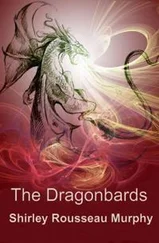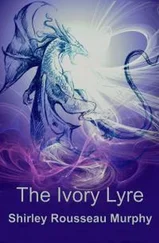She had made herself very comfortable in his dad's chair and was watching the ten o'clock news. She looked up and smiled. "Have you had your dinner, Charlie? There's spaghetti in the oven keeping warm," she said pleasantly. "And salad and apple pie. I'll just dish it up for you, then go on to bed."
He couldn't say anything. Why wasn't she giving him holy heck? He went to his room, got out of his wet clothes and into his pajamas, then settled himself alone before a huge plate of spaghetti. When he finished eating, he made some peanut butter sandwiches for their trip to the airfield the next day, then went to bed still wondering what was wrong with Mrs. Critch.
When he rose the next morning to find his favorite breakfast on the table and still not a word of reprimand, he grew uneasy. He wolfed his breakfast, slipped some pancakes and bacon into his napkin, hid this with the sandwiches in his jacket, and left.
He found the two animals working by the light of a candle stub inside the boarded-up hangar. He had brought a flashlight and some extra batteries. He shone the light in on the plane and saw that they had already repaired the tears and were working on a broken strut. The new unpainted paper shone thin and translucent in the flashlight beam. Charlie unwrapped the pancakes and bacon, somewhat stuck to the paper napkin, and the animals ate it all with great relish, including the syrupy paper.
When they started for the airfield, Rory, whose beak-wounds were beginning to stiffen and hurt, rode on Charlie's shoulder. Crispin, his stomach full of breakfast, went to sleep in Charlie's pocket.
The mechanic's hangar was an immense building. Beside the big hangar door was a small door into Charlie's father's office. Charlie unlocked this and opened a second door between office and hangar so the animals could see the planes. Crispin stood staring in awe, and even Rory seemed impressed. The roof of the hangar must seem terribly high to the lemming, but of course Rory had spent the winter in the hangar at Turbine Field so it was nothing new to him. He admired the six planes stored there, though. Charlie opened a closet in the office and began to haul out magazines, years' and years' accumulation of flying magazines. He piled them on the floor around the desk, and they all began to turn pages, looking for a picture of an old biplane with a pointed nose.
After what seemed hours of turning dusty pages, Charlie began to yawn. Crispin had gone to sleep. At midmorning Rory woke the lemming, and they split a warm Coke three ways into yellowed paper cups. Then Rory went into the big hangar to look at the planes again and discovered a puddle of water in the far corner and a small hole high above in the tin roof. "Looks like the roofing tin's been blown back, sonny. See there, where that piece is all bright instead of rusty. That patch must've been covered before. Hole's not much bigger than a pencil, but there sure was a lot of rain came in."
Charlie found a bucket, emptied the gears and bolts out of it, and placed it to catch any further leaks.
"That's a nice Cessna 180," Rory said. "You'd think these fellows wouldn't just let their planes sit here, that they'd be out flying in spite of the blasted birds."
"They did until that jet crashed. Then everyone— well, they're not flying any more," Charlie said.
"Seems to me a whole flappin' town full of humans ought to be smart enough to get rid of them somehow!"
"Well they ..." Charlie began, when a faint voice spoke from somewhere in the shadows. Charlie caught his breath, and they all stared toward the far corner.
"It's harder," came the voice. "It's harder to drive off starlings than you might think." The voice came from the crowded shelves, but they could see no one. It had been a very faint voice. Crispin stood on his hind legs, peering up at the clutter of engine parts and tools.
"There!" Rory said, pointing. Three shelves up, between some oil cans, they could now see a huddle of bright feathers, brown and red and white.
"Come on out of there!" Rory commanded.
A big bird stepped forward. He had a white breast spotted with brown, bright red triangles on his cheeks, and a black apron beneath his throat like a wide collar. He looked at them for a long time and seemed to consider Charlie particularly. There was an air of grandeur about him, but one of suffering, too. At last he spoke again. "Please, have you something to eat? I am nearly starved." He said this with quiet dignity. "It has been two days since I've eaten and
Charlie rushed for the office, brought back the lunch, and began tearing off pieces of sandwich.
The big bird ate carefully, though they could tell he wanted to gulp the food. He fluttered down once to drink from the puddle, then settled on the floor near Rory and Crispin. He was taller than they, and larger than a starling. They could see he had been nearly starved, yet he conducted himself with courtesy. They did not ask him questions until he had eaten his fill, drunk twice more, and seemed stronger.
Charlie had no idea what kind of bird he was, though he thought he had seen some like him. He was certainly handsome with his spotted chest, striped back and wings, and the red slashes on his cheeks. His eyes, dark and kind, did not have the beady glimmer of a starling's eyes. Nor was his voice like a starling's, but soft and calm. "He's a flicker," Crispin whispered to Charlie. "A red-shafted flicker. I met one in Canada, Charlie!"
"How did you get in?" Charlie asked. "Were you in here when we locked the doors? But that was six week ago!"
"Oh no, I wasn't here then or I would be dead by now," the flicker said. "I came in through that hole in the roof five days ago. It was a bigger hole when I first found it. But let me explain. I was trying to find a new home. We were desperate. We were living— are still living, I hope—in a hole in the wall on the outside of this building. But the starlings came." His voice faltered, and it was a minute before he could go on.
At last he said, "I have to get out, I have to find my family. I left my wife and three children to try to find a safe place. The starlings were making life unbearable for us. We were so afraid for the children. I knew about the hole on the roof, and I came up to investigate. I was perched there, looking in, trying to see if there was a way to get out once I got in, when the rusted roof gave way under me. Somehow I got tangled in the roof itself and was through and in the air before I could claw my way back. And in my struggle I must have dislodged part of the roof—one of those tin sheets—so it nearly covered the hole. Later, I couldn't budge it. Nor could my wife; she tried from outside. She dropped worms and grubs down to me for a while. But now—now it has been nearly two days since I've seen her. It was hard on her, I know, feeding those three hungry children all alone, and feeding me as well. I know she's exhausted, and she . . . I'm very worried about her, about all of them. My children were nearly ready to fly."
Rory had sat quiet through the flicker's story, but now he burst out, "Flappin' no good starlings!" And his whiskers were taut with fury. "Get up there on the boy's shoulder, friend! Give him a hand up, Charlie! We'll just see about that family of yours!" He leaped to Charlie's shoulder in one bound and balanced himself adroitly as Charlie knelt to lift the flicker, then lift Crispin.
Charlie made his way out through the small side door of the office and around the building as the flicker directed. "There! There it is," the flicker cried, and he took off so suddenly he nearly blew Crispin away with the wind of his wings. The bird flew straight up the side of the building to disappear in a hole in the wood siding.
He was gone for some minutes. When he returned he looked very lost. "I think the children must have flown—I pray they did, I pray they got away safely. The nest is cold. There has been no one in it for some time."
Читать дальше
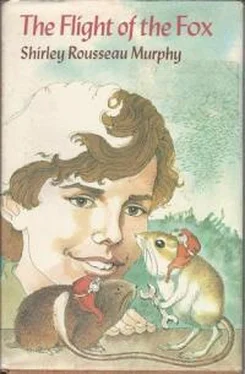
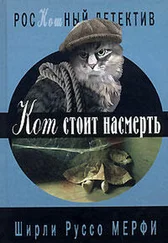
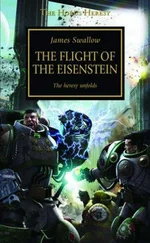

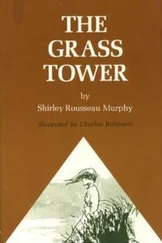
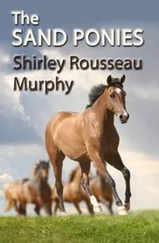
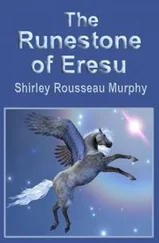
![Ширли Мерфи - The Shattered Stone [calibre]](/books/436059/shirli-merfi-the-shattered-stone-calibre-thumb.webp)
